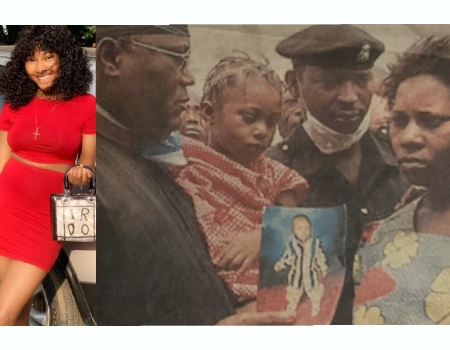
Ifeoma Emmanuel, who was a victim of the 2002 armoury explosion at the military cantonment in Ikeja, the capital city of Lagos State, which killed hundreds of people, is thanking God for sparing her life, as she celebrated 18 years after the sad incident.
However, Ifeoma’s kid brother was not that lucky, as he was killed in the unfortunate incident, leaving her as the only surviving child of their parents.
Now 22 years old, Ifeoma, in marking the 18th anniversary of the blast on the microblogging site, Twitter, via her handle, thanked God, for changing her story, asking former Vice President Atiku Abubakar to help broadcast her story as she copied him in her tweet.
“Today mark’s 18 I escaped death!But God changed my story (27/1/2002) during the bomb blast that happened in Ikeja cantonment when I was just 3+years old, that took the lives of millions of souls including that of my kid brother 😭😭and left me the only surviving child.”
Today mark’s 18 I escaped death!But God changed my story (27/1/2002) during the bomb blast that happened in Ikeja cantonment when I was just 3+years old.that took the lives of millions of souls including that of my kid brother 😭😭and left me the only surviving child. @atiku pic.twitter.com/IK6mWK3ILd
— Ifeoma Emmanuel (@ify_evelyn) January 28, 2020
In the featured image former Vice President Atuku Abubakar, could be seen carrying three-year-old Ijeoma, who survived the tragedy, and holding the photograph of her brother, who died in the canal, and standing with them is Ijeoma’s mother during the Abubakar’s visit to the site on Thursday, January 31, 2002.
The January 27, 2002, sporadic blasts at the military cantonment in Lagos left at least 1,100 people killed and displaced over 20,000, with many thousands injured or homeless.
Most of the people killed were children, who, with their parents, fled their homes for safety, but were either trampled in the stampede or got hooked inside the canal surrounding the military zone.
The loud noise which rented the military base and sporadic explosions which gave way to artillery shells and mortars raining down over thousands of homes, caused panic within the neighbourhood, which made many resident think it was a war.
In the panic, resident trooped out of their houses in thousands to the streets running helter skelter, without even knowing which way to go, as it was believed by many that war had started, and in the midst of the crowd, people expressed a series of thoughts, one of which was that the United States had started bombing Nigeria’s military base in Lagos.
Others felt it was a coup or an air strikes, as they thought Nigeria was under heavy attack from enemies of the country.
This was what aggravated the the situation that caused the stampede that led to the death of hundreds of people, while many others got stuck in the canal, as security experts said the death would not have been nearly as large if right information had been well circulated.
However, as bodies were of those who lost their lives were counted after the explosion at the army ammunitions dump that Sunday night, the number of victims ran to more than 600, but the death toll later increased to over a thousand on the final count the subsequent days.
Many children were killed in the cantonment bomb blasts, but it could not immediately be ascertained how many of the children were made orphans.
The bulk of the victims did not die under the exploding shells. Most were hauled from canals into which they jumped or were driven – some still in their cars – by the huge crowds fleeing the shrapnel descending from the sky.
Others died in the explosion at the barracks, which is a small town in its own right, built in the middle of a crowded, largely poor residential area.
Olusegun Ajayi, an army officer, said his home was destroyed and his three small children were missing.
“My wife and I don’t know where they are,” he said.
Yesterday, piles of bodies were growing next to the canals as distraught parents tried to see if their missing sons and daughters were among the victims.
The then country’s leaders, President Olusegun Obasanjo ordered an inquiry after reassuring nervous Nigerians that “the disaster at the Ikeja military cantonment was not an attempt by the military to seize power once again.” But that was of small comfort to many in the area.
The first explosions were heard before 6:00 pm on Sunday. Some of the shells burst above Lagos like fireworks, but then rained down burning shrapnel on the thin tin roofs of the rickety homes packed into the city’s poorer neighbourhoods. The shells destroyed whole buildings, including a church.
But by some miracle of organisation for which Lagos is not usually known, patients at a nearby hospital were all successfully evacuated.
The explosions shattered windows up to 10 miles away, and the thud of the blasts was felt 20 miles off.
By then, tens of thousands of panic-stricken people were trying to make their way out of the area. Hundreds became trapped near the Oke Afa and Pako canals. Some drowned because they did not realise how deep the water was. Others were forced into the canals by the sheer weight of the crowd trying to escape.
The explosions died down after midnight and at dawn fishermen began scouring the canals, and using poles to haul out the bodies.
Although there has been no official confirmation of casualties, the French news agency AFP reported a witness as saying that he had counted more than 580 bodies. Reuters reported a similar number of casualties.
“I am looking for my children. I have been here since the morning,” Shola Odun, a printer, told AFP. “They have been pulling the bodies out of here since first thing. They are taking them away. I am looking for my children, my relatives, there are more than 580 bodies. One man here lost six of his children. He found them. He is dying.”
Kazeem Kasali, the leader of a fisherman’s rescue team, said he had personally recovered 84 bodies and his team had recovered more than 300 bodies.
AFP reported that one local hospital had taken in 152 bodies, most of them children. The youngest was four years old.
The then Lagos police commissioner, Mike Okiro, said the tragedy was made all the greater by the numbers of children lost.
“Many people have reported missing children, and there are children looking for their parents,” he said.
The assumption early on that a military takeover was under way was not unreasonable as a number of coups have been launched from the Ikeja base, which is home to an elite parachute brigade.
But politicians and army officers appeared on television insisting that the blast was not the result of fighting.
“It is an accident and there is no political undertone to it,” said Brigadier-General George Emdin, commander of the Ikeja brigade. He then went on to claim there had been no serious casualties.
The army claims the blaze started in a market next to the barracks. The fire brigade says it began inside the ammunition store.
After the explosions died down, hundreds of shells – some of them glowing with heat – were scattered around the barracks and on the streets. At least one child lost a foot and an eye after treading on a piece of ammunition.
Nigeria has grown used to news of mass deaths. Thousands of people have been killed in religious and political violence over the past two years, particularly over the introduction of Islamic law in the north of the country.
But as fear turned to anger in Lagos, callers to talk radio stations denounced the government for incompetence and the military for worse.
Many complained that soldiers fled rather than help the injured. Others questioned what a market was doing next to an ammunition dump. But in overcrowded Lagos such things are not unusual.
“These are old ammunition depots and there are high-calibre bombs in there. Efforts have been made in the recent past to try and improve the storage facilities,” Brigadier-General John Anda said. “Unfortunately, I think this accident happened before the higher authority could do what it is supposed to.”
President Obasanjo toured the base yesterday, trying to pacify soldiers and their families. But he declined a demand from some in the crowd to take a closer look at the remnants of the munitions dump situated a few hundred yards away.
Last night, the authorities were trying to reunite hundreds of children with their parents.
“We have directed the police to create a particular location to ensure that missing children can be located by their parents,” President Obasanjo said.






